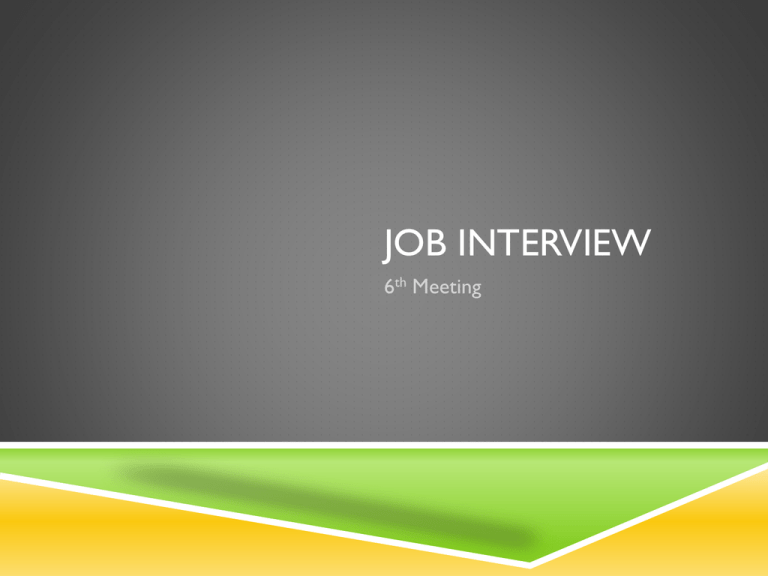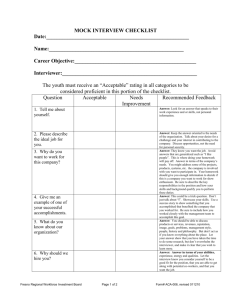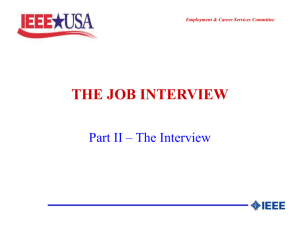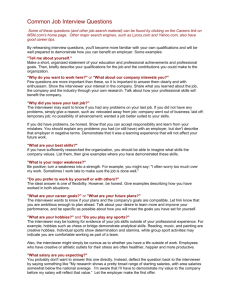6job interview
advertisement

JOB INTERVIEW 6th Meeting WHAT THE ADS SAY? Mention what job is advertised What are the requirements Is the Job ad interesting or not? Why? How is a good job ads should be in your opinion? JOB INTERVIEW TOP QUESTIONS What were your responsibilities? The best way to respond is to describe your responsibilities in detail and to connect them to the job you are interviewing for. Try to tie your responsibilities in with those listed in the job description for the new position.That way, the employer will see that you have the qualifications necessary to do the job. Focus most on your responsibilities that are directly related to the new job's requirements. Tell me about yourself. Your Unique Selling Proposition (USP) Give them "your synopsis about you" answer, specifically your Unique Selling Proposition. Known as a personal branding or a value-added statement, the USP is a succinct, one-sentence description of who you are, your biggest strength and the major benefit that a company will derive from this strength. Here is an example of a Unique Selling Proposition: "I'm a seasoned Retail Manager strong in developing training programs and loss prevention techniques that have resulted in revenue savings of over $2.3Million for (employer's name) during the past 11 years." What did you like or dislike about your previous job? When you're asked what didn't like about your previous job, don't be too negative. The reason is that you don't want the interviewer to think that you'll speak negatively about the new job or the company when you're ready to move on, if you get this job. Rather, it makes sense to talk about yourself and what you're looking for in a new role. What were your starting and final levels of compensation? Make sure that what you tell the interviewer matches what you listed on your job application. Refresh your memory prior to the interview by reviewing your salary history, so, you can speak in detail and accurately. Don't exaggerate or inflate your earnings. Many employers will check references and confirm your salary history prior to making a job offer. A discrepancy between what you reported and what the employer says could knock you out of contention for the job. What major challenges and problems did you face? How did you handle them? Be sure to include specific examples of how you handled a particular difficult situation. Discuss how you researched the issue and contributed to finding a solution. What is your greatest strength? The best way to respond is to describe the skills and experience that directly correlate with the job you are applying for. What is your greatest weakness? When you're asked what your greatest weakness is there are several different ways you can answer, including mentioning skills that aren't critical for the job, skills you have improved on, and turning a negative into a positive. How do you handle stress and pressure? Stress is very important to me. With stress, I do the best possible job. The appropriate way to deal with stress is to make sure I have the correct balance between good stress and bad stress. I need good stress to stay motivated and productive. I react to situations, rather than to stress. That way, the situation is handled and doesn't become stressful. I actually work better under pressure and I've found that I enjoy working in a challenging environment. From a personal perspective, I manage stress by visiting the gym every evening. It's a great stress reducer. What was the biggest accomplishment / failure in this position? The best way to respond is to give an example of something you accomplished that is directly related to the job you are interviewing for. Review your resume and review the job posting. Find the best match and use that to show how what you accomplished will be beneficial to the company you are interviewing with. Questions About Failure If you didn't fail at anything, say so. If you can think of an example, be sure that it's a minor one and turn it into a positive. For example, if you were working on a project that was behind deadline, explain to the interviewer how you adjusted the workload and the timeline to get back on track and ahead of schedule. How do you evaluate success? A question like this gives your potential employer a sense of your work ethic, your goals, and your overall personality. In your answer, you should be cognizant of the type of job you're applying for. Whereas a large corporation might place all their emphasis on the bottom line, a non-profit would measure success not in money but in social impact. Do your research before the interview: browse the company's website, research their presence in the news and media, and see if you can find any information about their mission statement. Why are you leaving or have left your job? Don’t Badmouth your boss If you are fired : Being cut loose was a blessing in disguise. Now I have an opportunity to explore jobs that better suit my qualifications and interests. My research suggests that such an opportunity may be the one on your table. Would you like to hear more about my skills in working with new technology? My competencies were not the right match for my previous employer's needs but it looks like they'd be a good fit in your organization. In addition to marketing and advertising, would skills in promotion be valued here? Why do you want this job? Keep in mind that you can customize these answers to fit your particular circumstances and the job you are applying for. This is not only a fine opportunity, but this company is a place where my qualifications can make a difference. As a finance executive well versed in the new stock options law, I see this position as made to order. It contains the challenge to keep me on my toes. That's the kind of job I like to anticipate every morning. Why should we hire you? The interviewer is really asking, “What makes you the best fit for this position?” Your answer to this question should be a concise “sales pitch” that explains what you have to offer the employer. The best way to respond is to give concrete examples of why your skills and accomplishments make you the best candidate for the job. Take a few moments to compare the job description with your abilities, as well as mentioning what you have accomplished in your other positions. Be positive and reiterate your interest in the company and the position. What are your goals for the future? Employers want to be sure that you won't be moving on to another job right away. The best way to respond to the interview question "What are your goals for the future?" or "Where do you see yourself in five years?" is to refer to the position and the company you are interviewing with. Don't discuss your goals for returning to school or having a family, they are not relevant and could knock you out of contention for the job. Rather, you want to connect your answer to the job you are applying for What are your salary requirements? Once you know what you should be earning, how do you go about getting it? Start by being very patient. When interviewing for a new position, do your best not to bring up compensation until the employer makes you an offer. If you're asked what your salary requirements are, say that they are open based upon the position and the overall compensation package. Or tell the employer you'd like to know more about the responsibilities and the challenges of the job prior to discussing salary. Another option is to give the employer a salary range based upon the salary research you've done up front. Once you've received the offer you don't need to accept (or reject) it right away. A simple "I need to think it over" can get you an increase in the original offer. Who was your best boss and who was the worst? the interviewer is trying to discover if you assess blame or carry a grudge. The interviewer also wants to determine if you are match for the leadership style of the company. Even if you had a boss who was awful, don't say so. Interviewers don't want to hear too much negativity and they will wonder what you will say about their organization if you were hired and it didn't work out. Best Answers I've learned from each boss I've had. From the good ones, what to do, from the challenging ones - what not to do. What are you passionate about? it's a good opportunity to share what is important in your life. It's also an opportunity to show your dedication and what's important to you. Your response doesn't need to be work focused, but do be sure that what you share isn't something that could potential cut in to your working hours. One of my greatest passions is helping others. When I was younger, I've enjoyed helping mom with household repairs. As I grew older, that habit grew and I desired to help others as well. I like helping people find solutions that meet their specific needs. Questions about your supervisors and co-workers. Have you worked with someone you didn't like? If so, how did you handle it? Yes, I've worked with someone whom I found difficult to like as a person. However, when I focused on the skills they brought to the job, their ability to solve problems and the two things I did appreciate, slowly my attitude towards them changed. We were never friends, but we did work well together. Questions about your career goals What are you looking for in your next job? What is important to you? Best Answers I'm looking for a position where I can have the opportunity to successfully use my skills. I want to be able to provide a company with the best possible work. I am looking for the opportunity to use the skills that I have developed during my years in marketing to engage your sales force and increase productivity and international sales. I am excited by the opportunity to learn about your company’s innovations, and utilize the experience I have in technology to help streamline your products for even more successful implementation. In my next job, I would like to be able to have a positive impact on my patients. Your facility offers patients a total recovery program, and I feel that my experience, education, and specialization would make this a good fit for me. BODY LANGUAGE Sitting Position for Male & Female Friendly or not? Outfit to wear for an interview Male and female Facial expression in an interview Eyes..where should you stare? HOW TO GET YOUR FIRST JOB Employment Eligibility Make sure you are legally able to work prior to beginning your job search. HOW TO GET YOUR FIRST JOB Be Creative in Where You Apply Everyone seems to gravitate to the same places? Why not try to think outside the box and apply in less common places. HOW TO GET YOUR FIRST JOB Have Information for Application Handy Be ready to do this while you are there by having the necessary information available including: How to contact you When you are available to work The names of your references and how to contact them The name and address of any volunteer work you’ve done Always include a copy of your resume even when you do fill out an application. HOW TO GET YOUR FIRST JOB First Impressions When people first job search they may not be aware of the importance of that first impression. Make sure you are properly groomed, and that you are wearing clothes that are neat and tidy. Never wear short skirts, tight clothing, or revealing clothing, and go easy on makeup and perfume. Be Persistent As a first time job hunter don’t get discouraged by the amount of rejection you hear. Be prepared not to be called, and not to be offered a job. There are things you can do to improve your chances of being hired and one of those is to be persistent. Come back often, and each time leave a copy of your resume. Always thank the employer for taking time to talk to you. Making the Most Out of Your First Job Your first job might not be what you dreamed of, but remember just a little experience can really help you to get that next job that’s more to what you were hoping for. It also allows you the opportunity for advancement. So show up on time for your shift, and always give it your best providing quality work. Your Future Career You may or may not know what you’d like to be in the future. If you have an idea of what type of career you’d like, you can always try to find work that would give you some experience in the general field. For example, if you’ve been thinking about being a teacher perhaps a job at a summer camp would be a great idea. Just remember no experience is ever wasted, and all your work experience including your very first job is valuable. “Your first job is a bit like your first date you aren’t quite sure what to expect” CHALLENGE Work in Pair, each students take turns to be the interviewer and interviewee with materials : A. Introduction B. Reason of Interest C. Strength and weakness D. Motivation of working E. Previous Working Experience F. Distinguished points G. Closing







